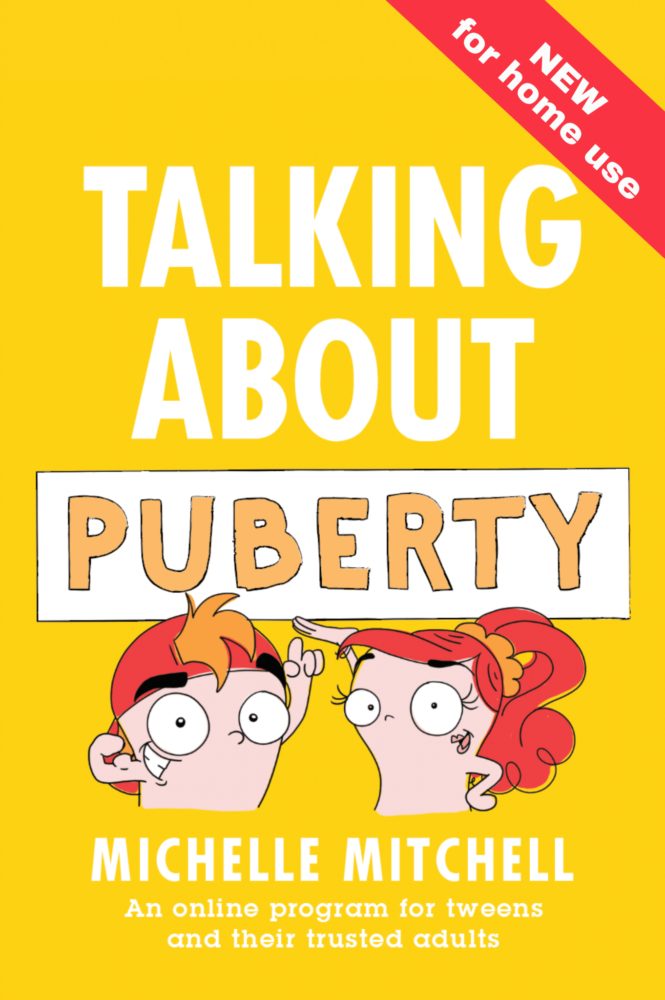Body Safety / Talking Sex, Guest Posts, Newsletter Articles, Posts for Parents, Raising Adolescents
Time to talk puberty? Here are 10 strategies to help you get started

A guest post from Michelle Mitchell
Most parents tell me that puberty wasn’t a subject freely spoken about when they were young. It just arrived, and they were left to work out the details by themselves. Some share stories about their parents handing them an educational book with the instructions, “Come to me if you have any questions.” Very few recall their parents speaking openly, honestly and often. I know we can do a whole lot better for our kids.
Our parents may not have known how to approach conversations about puberty and sex, yet neither were they expected to. Today’s highly sexualised world demands that parents step more deliberately into this space.
We have a big job on our hands, and ‘the chat’ is now all inclusive of topics that reach into cyber safety, consent and protective behaviours; topics we heard very little about when we were young. If you are unsure of HOW to comfortably initiate conversations, you are not alone. Responding to this generation’s needs is new and uncharted waters for everyone.
How do you know when your child is ready for you to start talking about puberty?
Be assured that one size does not fit all children. We need to tailor conversations to meet our child’s needs. Factors like IQ, maturity, temperament, life experience and birth order all impact our children’s readiness. How you choose to talk to your son or daughter about puberty can also be impacted by your own experiences, biases and needs so be conscious of this. I wrote in another blog post which addresses this titled, “Conversations About Puberty: Six Research Based Motivators for Parents”. You can find it here.
In this article I want to offer you ten practical strategies, all which are designed to help you communicate to both the most enthusiastic and reluctant of talkers. They are a set of tried and tested ideas that will show you how to practically talk to your son or daughter about puberty. I hope they help you connect with your child as they grow. This generation deserves to have trusted adults who are on their side.
Tip 1: Set up conversations well.
You can set a conversation up for success by planning it well. Remind yourself that a high-quality conversation has choice, joy and safety. How you offer these three things will have a great impact, so come with a smile, ask them where they’d like to start and be reassuring (even if you have to fake it a bit!). I always encourage parents to be mindful of their child’s emotional response to conversations, as how they feel will always determine if and how they learn.
Tip 2: Lower the bar.
Sounds weird doesn’t it? I encourage parents to initially set the bar low enough to easily achieve (for example – having an okay conversation), then you can build from there. Aim to eventually have conversations that are good, and then very good, but don’t put this pressure on yourself from the beginning or you may never get started! If things get off to a rocky start, remember that the more conversations you have, the easier they will become – guaranteed.
Tip 3: Be one step ahead.
If we want open conversations about any sensitive topic, we have to be prepared to initiate them. We have to take ownership and anticipate what they need, or might need in the not too distant future. Don’t ever ask a child to come to you with their questions. Go to them, and if they ask questions it is a bonus.
Tip 4: Start with the least sensitive information.
Start with the least sensitive information (like hygiene and using deodorant) and slowly build up. When they start glazing over, start again another day. You have time. Children are only able to learn when they feel safe. That is why talking to a child about puberty has to take into consideration their comfort levels.
Tip 5: Short chats work well.
You don’t have to talk about everything in one conversation or one weekend. Consider preparing a range of short 2-3 minute conversations based on their current needs. Talking to kids about puberty may look like a set of well-timed chats.
Tip 6: Give them a time frame.
There is a place for longer conversations about puberty. For longer chats, let them know how long it might take. I know this might sound weird, but they need to know you are going to shut-up at some stage! Try saying, “It’s going to take us about 40 minutes.” I also recommend spending less than an hour so you leave things on a high.
Tip 7: Make a list.
Try making a list of puberty related topics and asking them to choose the topic they want to talk about. That way they can choose their entry point. Some children have already read or heard information about puberty and bring a whole lot to the conversation. Others don’t. Sometimes you don’t truly know what they know until you ask them.

Tip 8: More than facts.
Don’t just talk about body changes. Prepare them for how they (and their friends) might feel about puberty. It’s easy to talk about facts (like growth spurts, periods and pubic hair) but don’t forget the emotional changes that come with see-sawing hormones and brain changes. Talking to kids about puberty needs to be personal and engaging. The more we address these areas the more relevant it is.
Tip 9: Alternative ways to communicate.
There is no one way to talk to children about puberty, so I encourage you to be creative. You might set up a shared journal, where your son or daughter can ask questions and have you answer them. Make sure you have a strict turnaround time of 48 hours with your response. Tweens live in the moment, so patience isn’t their strength.
Tip 10: You are the expert. Believe it!
If you have confidence in yourself, they will have confidence in you. We want our children to know that it is normal to talk to their friends about puberty, but they won’t be the best ones to go to when you need questions answered. Sometimes friends come up with crazy, off the chart silly answers to questions. We want them to have all their questions answered correctly, the first time. Set yourself up as the expert and tell them they can come to you any time.
And lastly, you might like to consider a resource. Even with all these strategies, many parents find it daunting to talk to their kids about puberty. What information should you cover, and in what order? How much information is appropriate and how much is too much? I’d always recommend parents purchase a book about puberty to help answer these questions. After all, you can fumble your way through it, or let someone else do the heavy lifting for you!
There are lots of good resources on the market. Choosing a book is like inviting someone into your family, so you need to make sure it’s the right fit for you. Cath from Sex Ed Rescue does some wonderful reviews of sexual health resources.
Michelle Mitchell is an award-winning speaker and bestselling parenting author. She has been termed ‘the teenage expert’ by the media and is sought after for her compassionate and grounded advice for parenting tweens and teens. Michelle started her career as a teacher, but soon discovered a special interest in wellbeing. Find all of Michelle’s wonderful books and other resources at michellemitchell.org.
This blog was originally posted on Michelle’s own blog.

Image credit: ©️ fizkes / adobestock.com



